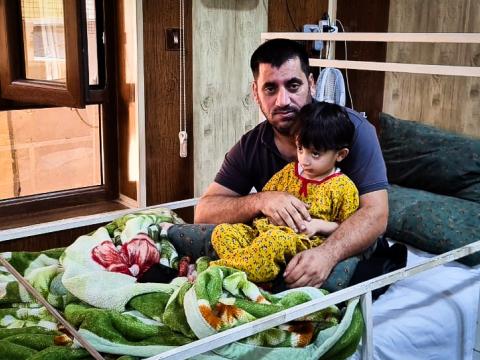Zanyar’s quest for independence

Ten years ago, everything changed for shopkeeper Zanyar.
He was in the bazaar of Tooz, 94.3 kilometers from Kirkuk, attending to the business of his shop, when a device exploded.
Zanyar was in a coma for twenty-one days. When he woke up, he was devastated to discover that he had lost his lower legs and became paralysed. Zanyar remembers, “I felt very bad when I learned I had become paralysed. I don’t have the words to describe it. I was always healthy, but then suddenly this happened.”
Zanyar today is a man of 36 and lives with his three-year-old daughter and wife in the heart of Tooz. He is confined most of the time to his bed or the wheelchair. Zanyar said, “Since then, I am always at home, in bed and or in the wheelchair. This situation is very difficult for my wife. I can’t shower on my own, or go to the toilet, my wife helps me all the time.”
Zanyar’s wife also suffers from chronic back pain as she continuously throughout the years has been carrying Zanyar and helping him with his movement and needs around the house.
Since the loss of his lower legs, Zanyar is no longer able to make a living for his family. He relies mostly on charitable people.
In Tooz services are limited for persons living with disabilities. Zanyar said, “My relatives helped me a lot through my financial difficulty. My wife is a housewife and doesn’t work. I would love to work if there were an opportunity to work, a chance to make a living or a way to improve my physical health. I cannot do any work because of the loss of my lower legs. Sitting for a long time injures my backside. So they have to lay me down in bed so that I don’t get bedsores.”
Even though he cannot do what he was able to do in the past, Zanyar wishes for the day when he will be able to support his family on his own without relying on relatives and charitable people. He wants to be able to return to those golden days when he was fully in charge of his life. Zanyar said, “I wish I could rely on myself. For example to run a shop to get an income. Before I used to work, I was in constant movement, and I was busy making a living for myself and my family. I would love to go back to those days and do something for myself and my family; to rely on myself. My only dream is to return to the past and be able to make a living.”
Zanyar’s earlier life
Zanyar was an infant when his father was killed in military operations by the former Iraqi regime. His mother raised Zanyar and six siblings thereafter, and as a single parent, she suffered a lot trying to make a living for the family.
Zanyar said, “We lived most of our lives in poverty. This country went through a lot in the 80s, 90s, and then in 2003, 2014 and 2017. We lived in never-ending suffering. I was seven months old when my father was killed. We were young, and my mother suffered a lot for our sake. We couldn’t work to support her because we were children. So we lived on the aid of charitable people.”
Zanyar dropped out of school when he reached fifth grade of primary school as his mother did not have the money to support him and his siblings with their education. Zanyar then started to work to support the family. He worked in different odd jobs to make a living. He started to work to shine shoes, then he was selling sweets and drinks in the bazaar. None of his siblings continued their education. Some of his sisters didn’t even go to school. Zanyar married in 2012, just two years before the explosion happened in the bazaar of Tooz that changed the course of his life. Zanyar said, “I suffered a lot during my marriage because I was injured in the bazaar explosion. I began to stay in my bed and wheelchair.”
Zanyar’s other needs
In Tooz district as in most of Iraq, services for persons living with disabilities are very limited and work opportunities are few. These days, Zanyar longs to be able to have the strength to support his family on his own, and to be able to stay as physically strong as possible despite his disabilities. Zanyar said, “I wish there were a hospital to provide treatment and physical therapy for us. I am so grateful that I am still alive. This was a trial from God. The availability of health services is essential, for example, every time I go to hospital my brothers help me to go there, but I would like it if there were a service where the staff from the hospital would come to take me.”
Further context on the situation of persons living with disabilities in Iraq
According to the UN Development Programme (UNDP), approximately 5% of the population in Iraq lives with some form of disability. The situation for people living with disabilities is very difficult in Tooz as well as in the rest of Iraq as there are very limited facilities, health services, social care, and opportunities for accessibility. As working opportunities are very limited as well there are barriers for people living with a disability to feel empowered, especially by being employed or having a business of their own. According to the Iraq Development Management Centre (2023), only 22% of disabled individuals in Tooz are employed, highlighting barriers to education and vocational training.